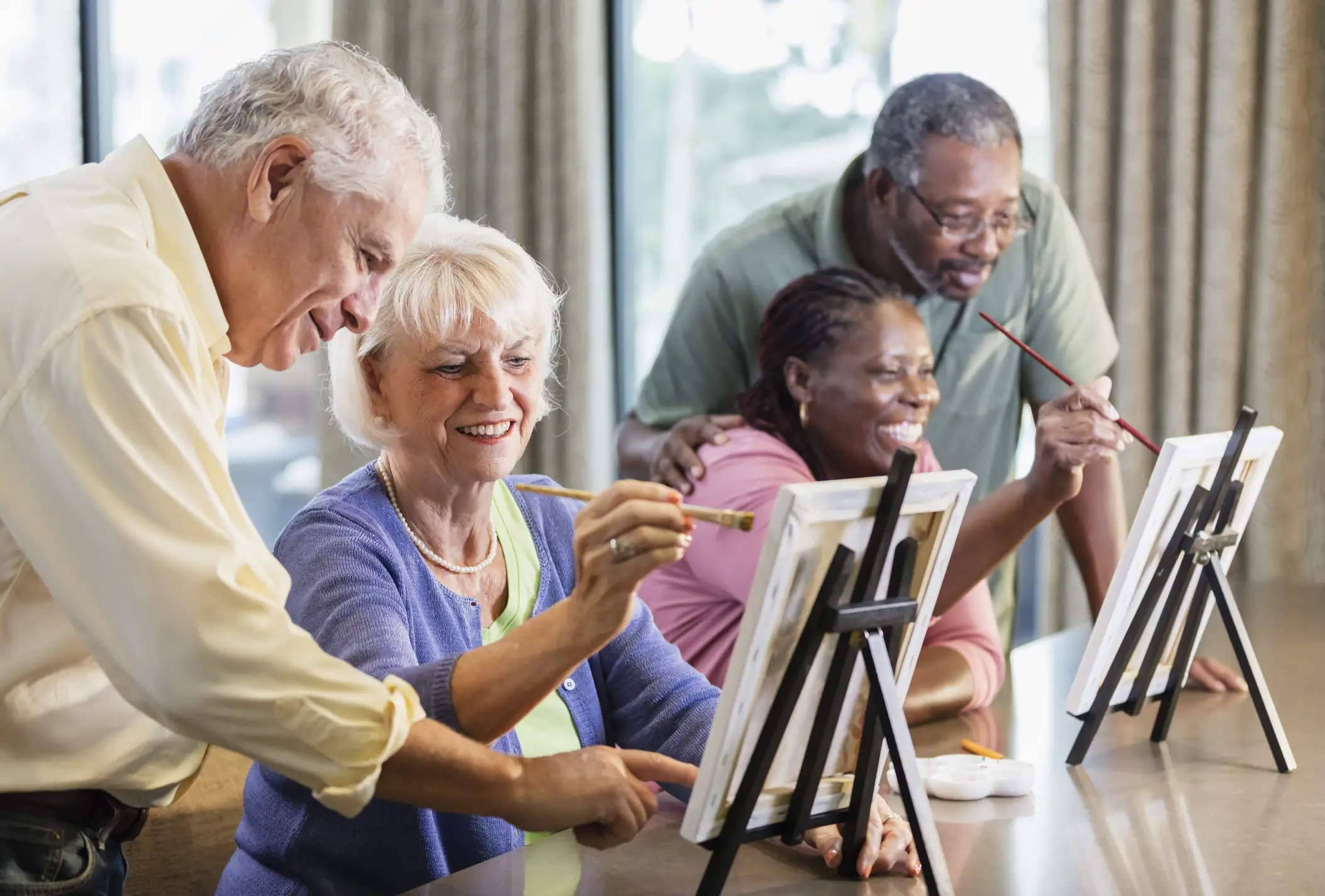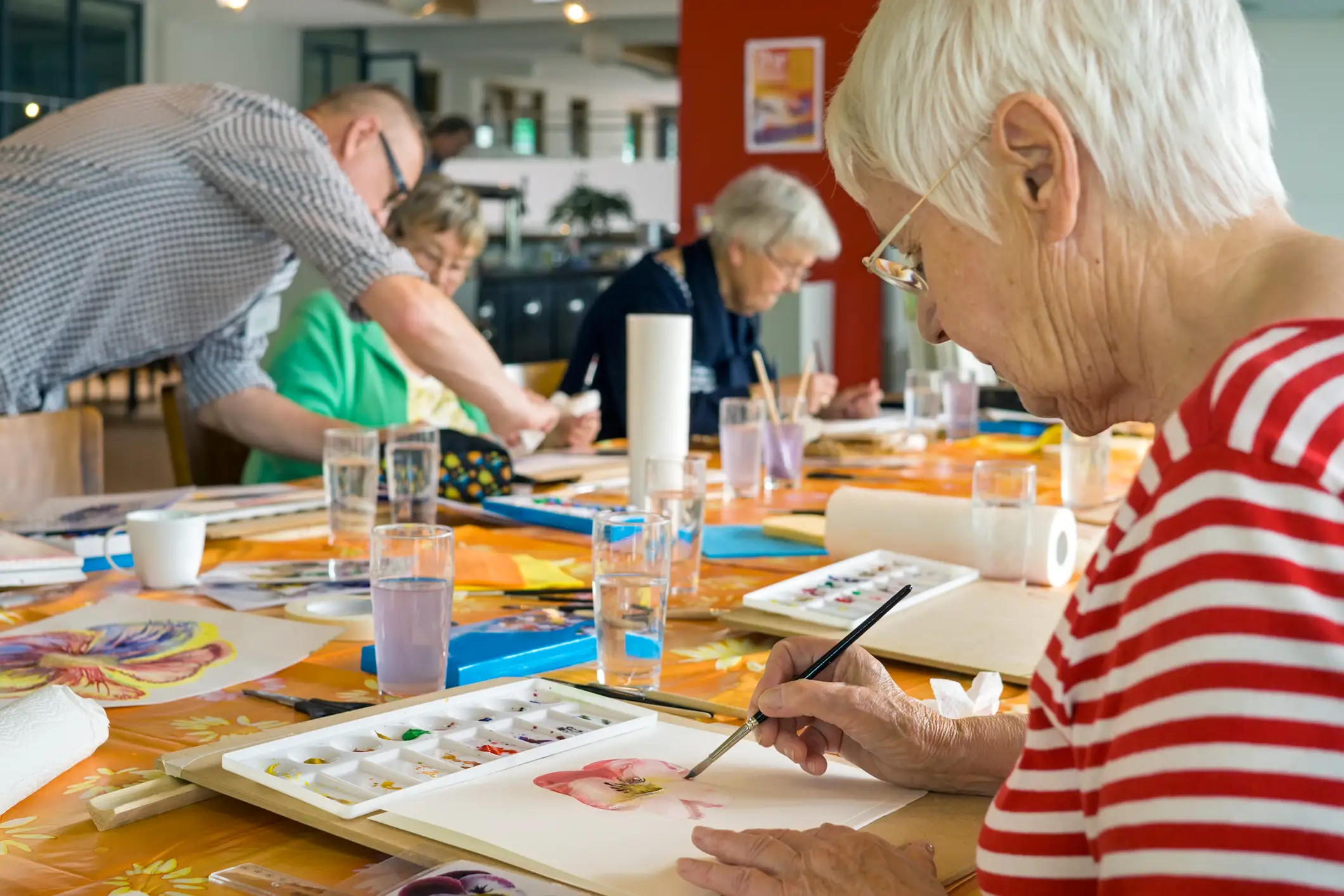Benefits of Painting for Seniors with Dementia

Art classes for seniors are important for many reasons, especially when it comes to painting with dementia. As the challenges of aging become overwhelming, particularly for those with cognitive decline, painting offers a meditative experience that can help ease the mind and calm the spirit.
Engaging in creative expression allows seniors to find beauty not only in the world around them but also within their own thoughts and emotions. Whether used as a tool for social interaction or quiet introspection, painting provides an outlet for connection, self-discovery, and emotional release – benefits that are particularly impactful for seniors living with dementia.
Art and Music: Enhancing Well-Being for People with Dementia
For people living with Alzheimer’s or dementia, creative activities like art and music have profound benefits. Creating art, particularly through painting, allows seniors to express emotions that may be difficult to verbalize, offering a therapeutic release.
Whether through strokes of vibrant colors or soothing melodies, both art and music engage the brain in ways that enhance emotional well-being.
Art projects can provide a calming, rhythmic experience similar to music, which can reduce anxiety and agitation often associated with dementia. For many, the simple act of starting a painting can become a grounding and comforting routine that promotes self-expression and connection.
Assisted Living: Painting and Dementia
In assisted living communities, providing residents with opportunities to engage in creative pursuits like painting is essential, especially for those with cognitive impairments. For seniors living with dementia, painting is more than just a hobby – it’s a powerful tool for brain stimulation.
As dementia progresses, the need for activities that engage both the mind and body becomes critical. Painting requires focus and encourages seniors to tap into their creativity, stimulating both sides of the brain.
This dual engagement can reignite passions and create pathways for communication and expression, helping seniors connect with themselves and others despite the challenges of memory loss. Witnessing the pride and joy on a resident’s face after completing a piece of art highlights the sense of achievement that boosts confidence and enhances feelings of independence – both vital for maintaining mental health in older adults.
Moreover, painting serves as a therapeutic tool and a nonverbal form of communication. As verbal abilities decline, expressing thoughts and emotions can become frustrating. Art allows individuals to share their feelings, memories, and creativity without words, with colors, shapes, and textures becoming their voice.
This tactile activity engages the senses and provides sensory stimulation, as the act of holding a brush, feeling the texture of the paint, and seeing vibrant colors come to life can be soothing and satisfying. These hands-on experiences help seniors stay connected to their surroundings, keeping their minds and bodies engaged.
In addition to fostering communication, painting stimulates different areas of the brain, offering significant memory rehabilitation benefits. The focus required during painting activates parts of the brain that may otherwise remain under-stimulated, creating positive mental and emotional effects. Art therapy has been shown to improve cognitive development and emotional resilience, helping to reduce agitation and restlessness while enhancing overall mood.
By incorporating painting into their daily routines, seniors in assisted living communities can enjoy the cognitive and emotional benefits of creative expression while fostering a sense of belonging and accomplishment in a supportive environment. Ultimately, painting bridges the gap between the inner world of someone with dementia and the outer world, making it a truly powerful form of therapy.

Additional Benefits to Painting for Seniors with Dementia
Painting can be so much more than just a creative hobby for seniors with dementia – it’s a powerful tool for boosting well-being and mental health. From sparking memories to lifting spirits, painting brings a range of benefits. Here are other ways painting can positively impact the lives of seniors living with dementia, helping them stay engaged, relaxed, and connected.
Promotes Personal Achievement
Completing a piece of art provides seniors with a profound sense of accomplishment. Each finished project acts as a tangible reminder of their capabilities and creativity, which can significantly boost their confidence. This feeling of achievement is crucial, especially for those living with dementia, as it reinforces the idea that they can still create and contribute, helping to combat feelings of helplessness.
Enhances Self-Esteem
Creating art reinforces positive self-worth and fosters a sense of pride in one’s abilities. As seniors see their skills develop and their ideas come to life on canvas, they gain a renewed sense of identity and purpose. This boost in self-esteem can translate into other areas of their lives, empowering them to engage more fully with their surroundings and relationships.
Soothes and Relaxes
The calming act of painting is a form of mindfulness that helps reduce stress, soothing both the mind and body. Engaging in the rhythmic motions of brush strokes and the visual pleasure of colors can create a meditative experience, allowing seniors to escape from the worries that often accompany dementia. This relaxation can promote overall emotional stability and peace.
Reduces Anxiety and Depression
Painting offers an emotional release, allowing individuals to express feelings that may be difficult to verbalize. This creative outlet can reduce feelings of anxiety and depression, as it encourages seniors to channel their emotions into their artwork. The process of creating something beautiful can help lift spirits, providing an essential outlet for processing complex feelings.
Fosters Creative Expression
Art provides a non-verbal way for seniors to express thoughts and emotions freely. For those who struggle to communicate verbally, painting can become a vital means of self-expression. Colors, shapes, and textures can convey feelings and memories that words may fail to capture, helping seniors connect with their inner selves and share their unique perspectives.
Lifts Mood and Well-Being
Painting triggers the release of endorphins, the body’s natural mood lifters, which can significantly improve overall well-being. As seniors immerse themselves in the creative process, they often experience an uplifted mood, contributing to a more positive outlook on life. This enhancement in emotional health can help them navigate the challenges associated with dementia more effectively.
Encourages Playfulness and Humor
Engaging in art fosters a lighthearted, playful approach to life, allowing seniors to experience moments of joy and laughter. The act of creating art can unleash a childlike curiosity, encouraging them to experiment with colors and shapes without the fear of judgment. This playfulness can invigorate their spirits and foster a sense of fun in their daily routines.
Offers a Sense of Control
Seniors are empowered to make their own creative choices while painting, which gives them a sense of independence. The freedom to choose colors, techniques, and themes allows individuals to assert their preferences, fostering a feeling of control over their environment. This empowerment can be especially important for those facing the unpredictability of dementia.
Provides Socialization
Group art sessions promote interaction among seniors, reducing feelings of isolation and encouraging a sense of community. Working alongside peers can spark conversations and friendships, enhancing social connections that are crucial for emotional health. These shared experiences not only enrich their lives but also create lasting memories and bonds among participants.

Positive, Purposeful Memory Care
At Westminster Place, we believe in providing holistic memory care tailored to the unique needs of each resident. Our GuidePoint Memory Method program combines specialized memory care with engaging activities, including physical fitness and creative art classes, that encourage social interactions and foster meaningful friendships.
We’ve witnessed firsthand the profound benefits of painting for seniors with dementia, as it offers them a vibrant way to express themselves and connect with their surroundings.
If you’re interested in learning more about Memory Care at Westminster Place or would like specific information about our art classes for seniors, please reach out to us today at 847-558-7747. We’re here to answer your questions and help you schedule a tour of our welcoming senior living community, where creativity and care come together to enhance the lives of our residents.



